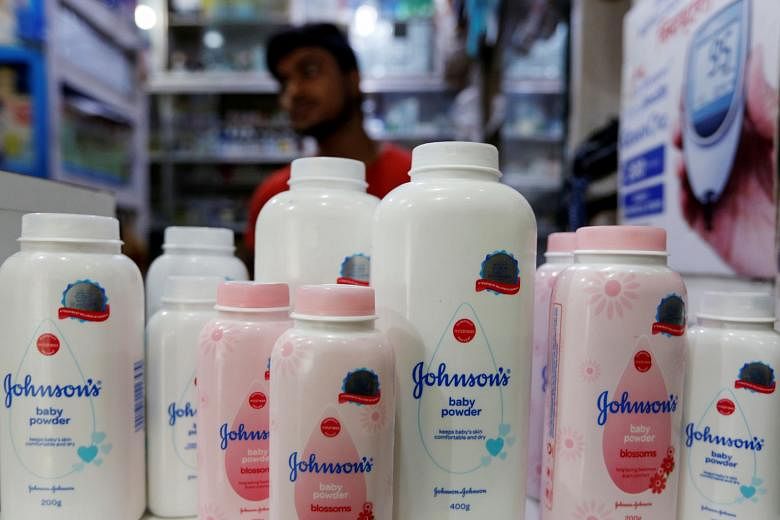NEW DELHI • India's drug regulator has ordered Johnson & Johnson (J&J) to stop manufacturing its baby powder using the raw materials in two of its Indian factories until test results prove they are free of asbestos, a senior official has said.
The official from the Central Drugs Standard Control Organisation (CDSCO), who declined to be named citing the sensitivity of the matter, said on Thursday that a written order had been sent to the American company, telling it to stop using the "huge quantities" of raw materials stocked in its plants in northern and western India.
The firm said on Wednesday that the Indian drug authorities visited some of its facilities and took "tests and samples" of its talcum powder.
It also said the safety of its cosmetic talcum powder was based on a long history of safe use and decades of research and clinical evidence by independent researchers and scientific review boards across the world.
The CDSCO also collected samples of the company's baby shampoo and soap products as a matter of routine, the official said.
"Whenever inspectors feel there is contamination in one thing, they also take samples of (other products) from the same company," the official said.
The visits came as the CDSCO and state-based food and drug administrations launched an investigation into J&J's baby powder following a Reuters report last week that the company had known for decades that cancer-causing asbestos could be found in the product.
J&J has described the Reuters article as "one-sided, false and inflammatory". The company told Reuters that it is in full compliance with the Indian regulatory requirements for the manufacturing and testing of its talcum powder.
"All talc in India is sourced and exclusively sold in India and surrounding markets - including Sri Lanka, Bangladesh, Nepal, Bhutan, Maldives - and fully meets the regulatory standards of the government of India," the company said.
J&J also said its talcum powder is routinely tested by both suppliers and independent laboratories to ensure that it is free of asbestos.
When asked if the order meant the company would have to stop producing its ubiquitous baby powder in India for now, the official at the drug regulator said that was "the inference you have to take", at least as far as the stores of raw materials were concerned.
"We have told them that until this investigation concludes, they should not use the raw materials. Test results will take time," the official said. "Testing for asbestos is not a routine procedure. It might be in traces. It will require us to develop a method and all those things."
J&J's baby powder is one of the most recognised foreign brands in India. The company started selling its baby powder in India in 1948, just a year after the country won independence from Britain.
Presenting gift boxes containing the talcum powder and other products aimed at newborn babies is almost a family ritual in this country of 1.3 billion people, 28 per cent of whom are aged 14 and under.
The company also commands a strong retail distribution network through small pharmacies, larger stores and the Internet.
There is yet to be any significant signs of a backlash against J&J products in India. Out of eight pharmacies across India visited by Reuters reporters on Thursday, seven said J&J remained the No. 1 seller of powder for babies.
That does not mean it is not under pressure from local and international competitors that sell talcum-type powders, such as Bengaluru-based Himalaya Herbals and Italy's Artsana, which makes Chicco baby products.
And some individual consumers say they are now very wary of J&J's baby powder. "It is really very, very shocking," said Mr Sitaram Beria, a chartered accountant in the eastern city of Bhubaneswar.
He said he stopped applying J&J powder to his six-month-old baby after hearing about the Reuters report at the weekend.
J&J leads sales in the Indian baby and child toiletries market, which market research provider Euromonitor estimates would be worth 12.5 billion rupees (S$244 million) this year, and forecasts will grow 84 per cent to 23 billion rupees in 2022.
Euromonitor did not give a breakdown for baby powder alone, but said J&J was the biggest player in the overall segment, followed by Mumbai-based VVF, Artsana, Wipro of Bengaluru and Himalaya Herbals.
Himalaya Herbals said in a statement that its herb-based baby care products "are exclusively promoted and recommended by over 40,000 doctors in the country, which is the greatest endorsement for us", while declining to provide any financial figures.
The other companies could not be reached for comment.
REUTERS

